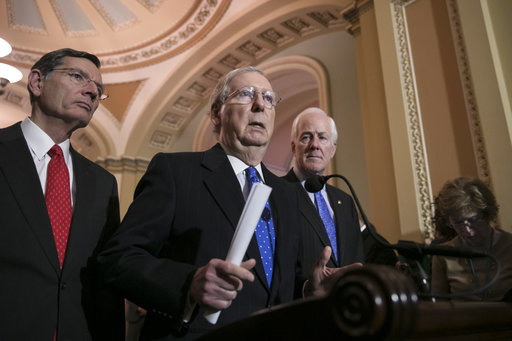What happens during a government shutdown

Senate Majority Leader Mitch McConnell, R-Ky., flanked by Sen. John Barrasso, R-Wyo., left, and Majority Whip John Cornyn, R-Texas, speaks to reporters about efforts to avoid a government shutdown this weekend, at the Capitol in Washington, Wednesday, Jan. 17, 2018. (AP Photo/J. Scott Applewhite)
In October, a budget for funding the government for the fiscal year was due. After months of short-term solutions, the clock ran out on Friday night. After passing through the House on Thursday, the proposed short-term spending bill moved to the Senate to be voted on before the previous budget expired. In the Senate, the bill faced a stalemate from the filibuster rule being invoked. This meant that, rather than a simple majority, the Senate would need 60 votes to pass the budget and keep the government funded. Since Republicans do not have a super-majority, debate continued and the government shut down over the weekend and into Monday. However, in a moment of compromise on Monday afternoon, the Senate passed another temporary budget to keep the government open.
The brief shutdown, termed the “Schumer Shutdown” by Republicans and the “Trump Shut Down” by Democrats, did have consequences for Americans in its three day tenure. While the military, postal service, social security services, and the Justice Department continued their operations, all non-essential federal employees were furloughed over the weekend and on Monday were asked not to come in to work. National Parks and federally funded museums, such as the Smithsonian, were also closed over the break, putting a damper on some family trips.
More devastating effects would have been seen if the shutdown had continued. During the three week long shutdown of 1995-96, there were larger consequences to the stalemate. The American tourism industry took an economic hit, two-hundred thousand passport applications were backlogged, and Department of Education staffers had to process over one hundred thousand loans and grants. If the recent shutdown had continued, the military would have run out of funding on February 1st, meaning the troops would have had to operate without complete funds until an agreement was reached.
The shutdown happened in the first place due to a disagreement between parties over how to fund the government. The Republicans proposed a short-term solution in order to avoid the shutdown while still working on a longer-term budget. Democrats were not happy with the proposed budget due to the lack of clarity over DACA and the short-term funding of the Children’s Health Insurance Program (CHIP). President Trump was firm in his stance that the new budget must be strong in providing funds for the military and for border security, including his proposed wall.
“We need the Wall for the safety and security of our country. We need the Wall to help stop the massive inflow of drugs from Mexico, now rated the number one most dangerous country in the world. If there is no Wall, there is no Deal!” said President Trump in a statement on Twitter.
On Monday, Senate Majority Leader Mitch McConnell was confident that there could be a bipartisan effort to reopen the government, and reopened the vote. In a 81-18 vote, the temporary budget passed and the shutdown ended. This spending bill funds the government until February 8th, at which time another spending bill will need to be put together.
The new bill appeased uneasy Democrats by extending the funding of CHIP for the next six years. It also delays three Obamacare taxes for a later time. There was also a commitment by the Republicans to address DACA as part of a longer-term spending bill. If this is not done by the February 8th deadline, then DACA and immigration legislation will immediately proceed.
“This immigration debate will have a level playing field at the outset and an amendment process that is fair to all sides,” said Sen Majority Leader Mitch McConnell when discussing the goals for immigration reform and DACA with the new budget.
The short-term spending bill will likely be signed by President Trump so the government can reopen on Tuesday. The three-day long government shutdown caused by the partisan divide in Congress was brief, but telling of the current division in the Union. As the February 8th deadline approaches, the Senate must compromise to give government funded programs and operations the attention required for a safe and stable America.

